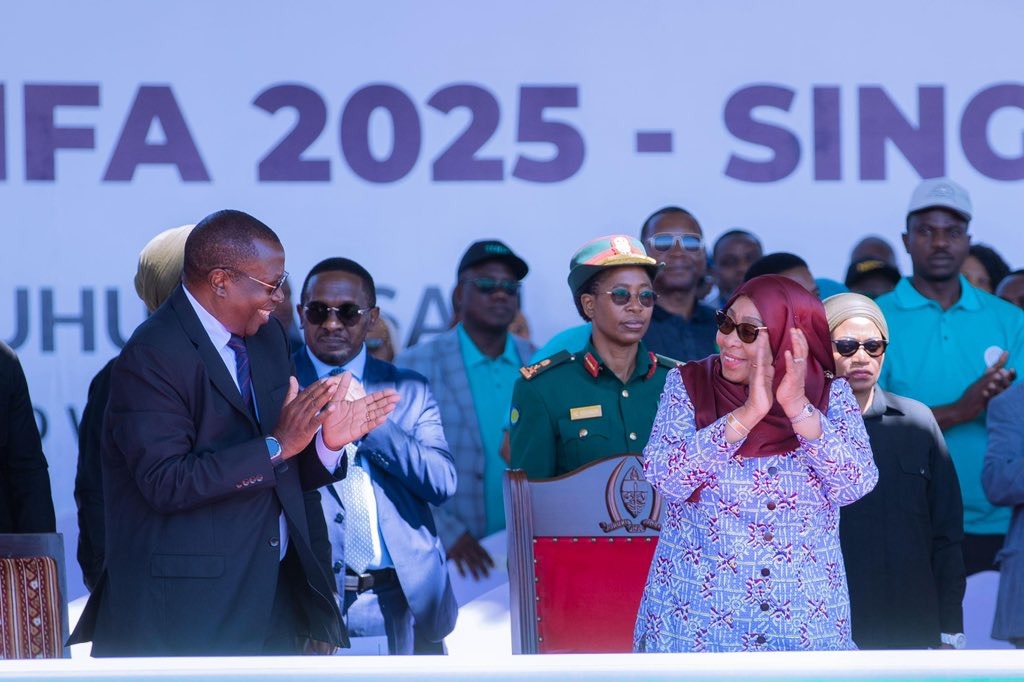On May 1, 2025, President Samia Suluhu Hassan and Vice President Dr. Philip Mpango participated in a vibrant display of unity and camaraderie by singing the ‘Solidarity Forever’ anthem during the International Workers’ Day celebrations at Bombadia Ground in Singida, Tanzania. The event, a significant national gathering, drew thousands of workers, union leaders, and government officials to honor the contributions of Tanzanian laborers. The image of the nation’s top leaders joining voices in this iconic anthem, a global symbol of workers’ solidarity, underscored the government’s commitment to fostering a sense of togetherness and addressing workers’ welfare. This moment was captured and shared widely, resonating as a powerful gesture of leadership aligned with the aspirations of the working class.

The celebrations at Bombadia Ground were marked by a festive yet purposeful atmosphere, with President Hassan delivering a keynote address that announced a landmark 35.1 percent increase in the minimum wage for public servants, raising it from Sh370,000 to Sh500,000, effective July 2025. As she and Vice President Mpango sang ‘Solidarity Forever’ alongside other dignitaries, including Trade Union Congress of Tanzania (Tucta) President Tumaini Nyamhokya, the anthem’s lyrics echoed the government’s pledges to improve workers’ lives. The event highlighted the administration’s focus on economic growth, with Hassan noting the country’s 5.5 percent economic expansion as a foundation for sharing prosperity with workers. The sight of the leaders singing together symbolized a shared resolve to bridge the gap between policy promises and tangible outcomes for Tanzania’s workforce.
Vice President Mpango, known for his reserved demeanor and long-standing public service, complemented President Hassan’s leadership during the event. His participation in singing the anthem reinforced his role as a steadfast supporter of the administration’s worker-centric policies. Mpango also spoke at the event, emphasizing the critical role of workers in driving national development and urging them to register for the upcoming October 2025 general election to ensure their voices shape future leadership. The joint appearance of Hassan and Mpango, singing in unison, projected an image of unity within the ruling Chama Cha Mapinduzi (CCM) party, particularly significant as the country approaches the 2025 elections. This public display of harmony countered narratives of internal party friction, showcasing a cohesive front dedicated to national progress.
The choice of ‘Solidarity Forever,’ a song rooted in the global labor movement, carried deep symbolic weight in the Tanzanian context, where CCM historically aligns with socialist principles and the upliftment of workers and peasants. President Hassan, often referred to as “Mama Samia,” has worked to reorient CCM toward its foundational ideologies, as noted by political analysts. Her leadership, paired with Mpango’s economic expertise, has sought to address longstanding worker grievances, such as delayed promotions and inadequate wages, as highlighted by Tucta’s Nyamhokya during the event. The anthem’s performance was not merely ceremonial but a reaffirmation of the government’s ongoing dialogue with trade unions and its responsiveness to workers’ demands, fostering trust between the state and its labor force.
The Singida celebration, set against the backdrop of Bombadia Ground’s lively crowds, was a testament to Tanzania’s evolving political and economic landscape under Hassan’s presidency. As the first female president and a Zanzibari, Hassan’s leadership has been marked by democratic reforms and efforts to globalize Tanzania’s economy, while Mpango’s presence reflects continuity and stability. Their shared moment singing ‘Solidarity Forever’ encapsulated a broader narrative of inclusivity, economic progress, and political unity. As Tanzania gears up for the 2025 general election, this event at Bombadia Ground will likely be remembered as a defining moment, where the nation’s leaders stood shoulder-to-shoulder with workers, singing a song of solidarity that reverberated across the country.
About Workers’ Day
Workers’ Day, celebrated annually on May 1st, is a global commemoration dedicated to honoring the contributions, struggles, and achievements of workers worldwide. Also known as International Workers’ Day or May Day, it originated in the late 19th century during the labor movement in the United States, specifically tied to the 1886 Haymarket affair in Chicago. Workers were advocating for an eight-hour workday, safer working conditions, and fair wages, demands that were met with resistance from employers and authorities. The violent clash between police and protesters at Haymarket Square became a pivotal moment, galvanizing the global labor movement and leading to the establishment of May 1st as a day to recognize workers’ rights. Today, Workers’ Day serves as both a celebration of labor’s progress and a reminder of ongoing challenges, with events ranging from rallies and parades to official ceremonies in countries across the globe.
In many nations, Workers’ Day is a public holiday marked by speeches, cultural performances, and gatherings that highlight the importance of labor to economic and social development. Governments, trade unions, and civil society organizations use the occasion to address pressing issues such as job security, minimum wage laws, gender equality in the workplace, and protections for informal or gig economy workers. For instance, in countries like Tanzania, as suggested by the reference to Samia and Mpango, leaders often attend or host events to engage with workers, emphasizing unity and policy commitments to improve labor conditions. These celebrations foster a sense of solidarity, with workers from diverse sectors—factory laborers, teachers, healthcare professionals, and more—coming together to reflect on their shared contributions.
Despite its festive elements, Workers’ Day also remains a platform for advocacy. In some regions, it is a day of protest, where workers and unions voice concerns over exploitation, unfair labor practices, or economic policies that disproportionately affect the working class. The rise of automation, precarious employment, and globalization has introduced new challenges, making the day a critical moment to push for modern labor protections. In 2025, as economic disparities and technological shifts continue to reshape workplaces, Workers’ Day remains a powerful symbol of resilience and collective action, urging societies to prioritize the dignity and rights of those who drive progress through their labor.




